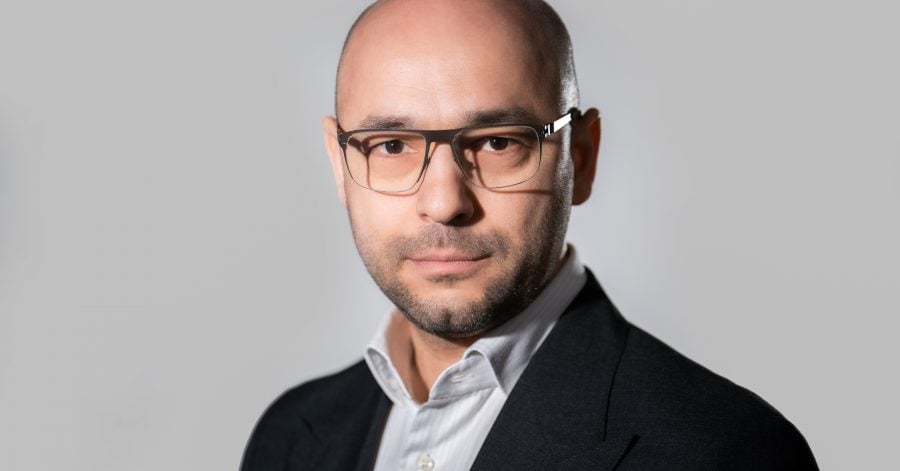“Starting a startup is not for everybody,” says Cristian Munteanu, founder and managing partner of Early Game Ventures, an early-stage venture capital firm launched in Romania in 2017. With Druid AI, Kinderpedia, Questo, Bunnyshell, and CODA Intelligence, among others, in their portfolio, the VC is interested in founders that think big, but that are also coachable.
Cristian Munteanu has a background in media and advertising. He has founded companies, like Merlin Advertising, in 2004, which was acquired by TBWA, a global advertising network, Qalendra Inc, in 2013, which offered automated travel research, and he was a co-founder of Scooterson, in 2016, an autonomous scooter startup.
He is a board member of Questo, a travel gamification startup; Neobility, which offers optimization of public transportation; and FameUp, a mobile platform connecting micro-influencers with companies.
The Recursive met with the managing partner of Early Game Ventures to discuss plans for 2022, deal flows, and mentoring startup founders, both male and female.
The Recursive: What are Early Game Venture’s plans for 2022?
Cristian Munteanu: It is going to be a very important year in the economy of our first fund and we will have the first closing of the second fund. By the end of the second quarter, we should be in the position to launch it. We will stop investing from the first one and start making investments from the second one.
Also, five or six startups in our portfolio will raise their series A. We already have the first two or three this year, Druid and Bunnyshell. It’s a very good moment for us to show that we have done a good job in the last three years perfecting active investments.
Are you interested in specific verticals or solutions?
We are a generalist fund because we only invest in Romania. We cannot be too niched from this perspective. We are interested in anything related to technology except for medical devices, biotech, new drugs, healthcare at large. Otherwise, anything is of interest – cybersecurity, fintech, AI, enterprise software, to name a few.
Why these niches?
In venture capital, there is always an opportunistic approach. You may be smart and have a well-defined investment thesis, but in the end, you depend on what the market has to offer.
Maybe I have a brilliant thesis on space, but if there is no space tech startup in Romania, it means I will make no investments. We have our thesis in agritech. The problem is that so far, we haven’t been able to find startups in Romania that build something newly integrated.
What is EGV’s modus operandi: do you scout for the top startups, or select from startups that reach out, and why did you opt for this business style?
The deal flow is the secret juice.
There are different levels of it the way I see it.
- The first level is the shallowest; it’s floating on the surface. I include here all the startups that are everywhere, present at events and pitch sessions. The visible founders and startups are not necessarily the best. Founders that spent too much time doing PR, don’t spend enough time building the product and talking to customers. Everybody knows about them, and pretty much no one invests in them.
- If you go deeper, there are the other good startups, the teams that stay in the laboratory, work on the product and with customers, make progress, and get traction. You need to be connected to the ecosystem and actively search for these guys.
- Thirdly, there are the startups that are not even there, the ones you ignite. If you have a very strong investment thesis and see that no startup in your target market is working on it, you start talking to people and try to put together the team to do it.
But you need to be active. You cannot be lazy as a VC and wait for the companies to come to you.
Tell us about a startup that you helped ignite.
One example is Watto Stations. They are building a network of ultra fast-charging stations for electric vehicles in the country. The investment thesis is in electromobility, it is going to be an infrastructure startup.
In Romania, people don’t buy electric cars, because they have nowhere to charge them. Nobody is building the charging infrastructures because there are no electric cars to be charged.
We see it as a vicious circle. Our opinion is that as a VC fund, we are in a position to break it. We can afford to invest in a startup to create a supply before the demand is there.
What kind of relationship do you aim to build with the founders you invest in?
Chemistry is very important when you invest.
We look at many things, but if we cannot work together, we have no chance of building something meaningful.
Secondly, we invest in coachable founders. There is a line between being coachable and being a yes-man. As a founder, you need to have your own opinions, but you need to be flexible and accept other people’s opinions as well if they make sense.
Never be a yes-man. You cannot be too stubborn because, again, there is a fine line between being stubborn and being stupid. It’s a quality for a founder to be stubborn, but if you’re stupid, that’s an issue.
We try to discuss this with all the founders in our portfolio. We always express our opinions and try to be even brutally honest when needed. This is the feedback that our founders appreciate. They don’t want the BS. They want us to tell them straight in their face what we think.
Among the startups in your portfolio, there are several with female founders, like Bunnyshell, Druid, Kinderpedia, and MeetGeek.AI. But there’s still a big gap in the access to capital for the female founders. Why is that according to you?
In my opinion, it is not about increasing the access of women to venture capital money. It’s about increasing the demand from women for venture capital money.
It doesn’t matter to me as an investor if you are a male, a female, or a golden retriever. When you come asking for money, I will look at your deck and if it makes sense, I will meet you and I will invest. Access is not the problem.
There is very little demand for VC money from women. Two years ago, I read this study and it was about the sacrifices that founders were willing to make for the company. There was one question about who was willing to relocate to another country should the startup need something like that.
In the case of male founders, more than 90% of them were willing to move to another country if that would be the requirement to get the money or for the startup to perform well. Do you know the percentage of women founders? Around 4%. Why? Well, I think that the main answer is: ‘it’s a cultural thing’.
Women are not that easily relocatable, they have, maybe, I don’t know, stronger ties, family ties, friends ties with the mother country. For them, it’s very intrusive to relocate. On the other hand, males are, maybe, more irresponsible. We are. We throw headfirst into anything. For us, it doesn’t matter. It is not something bad about men, it is not something bad about women.
Do you try to bridge the gap between women and men?
The desire to start a startup must come from within, you cannot impose it on anyone because it’s going to be fake. If it’s not genuine, you are going to fail.
You need to have the internal drive to build a startup. You are going to use this energy in the years to come because you have to wake in the middle of the night to do whatever it takes for your startup to succeed.
We should find the genuine female entrepreneur, the one that truly has this drive to prove themselves and to empower those women, not women at large. I have said this many times: the only thing that makes sense in this life is to start a startup.
At the same time, starting a startup is not for everybody. It’s only for the really tough people, the resilient ones that can manage denial or rejection, and you will get hundreds of “No’s” from investors. If you are not up to it, don’t do it. Take a job, have a family, do a small business. Don’t start a startup because you’re going to be very unhappy.
In the region, we have many women graduating from tech colleges and statistics show that there are around 40% female entrepreneurs in Romania. How can we encourage more women to try and run a business?
Women are very good managers. They have some qualities that men don’t. For example, we don’t know about emotional intelligence. This is a concept that’s alien to men. We don’t have the organ for it or something, but we are lovable because we don’t have it.
In my mind, it makes a lot of sense to have women in top positions as managers in tech. Women don’t start as many startups as men do. I don’t have an explanation for that, but it is a fact. I think that the appetite for risk has something to do with it.
Many men make rushed decisions, women don’t do that. Taking a lot of risks comes with many dangers, but with many rewards if you are right. The number of CEOs in the world says something about taking risks. Risks can be disastrous for companies, but if they are right, they become Elon Musk-level kind of entrepreneurs.
What are your observations in mentoring women founders?
I mentioned that you don’t have to push anyone, man or woman. The drive must come from inside. I think it’s very helpful to share with all the founders as many things as possible from the world of investors, to explain to everybody how things are working in the venture capital world, what’s important and what is not, and I think it is essential in a young ecosystem as Romania. This is part of education.
Most of the founders are first-time founders. They will face for the first time in their life problems that are pretty obvious for an experienced entrepreneur. So, I truly believe in mentorship. This is why we also organize office hours and participate in events.
I encourage women, I mentor via StepFWD [an eight-week pre-accelerator for tech startups with diverse teams – ed.note.]. I even launched a call for startups dedicated to female entrepreneurs, but the response was close to zero.
Just do this experiment next time when you are at an in-person tech event: Ask everybody who’s a woman in the audience to raise their hand if they are a CTO. Most probably, very few will raise their hands. Then, ask all the rest if they would like to be a CTO at one moment. You will see that very few hands are up.
In my opinion, women don’t see themselves as technical leaders in a team. For me, as an investor, whenever I see a female CTO surrounded by four or five developers that are listening to her, I think ‘that’s a good CTO’. It’s a sign that something is good here. I should look into it.







